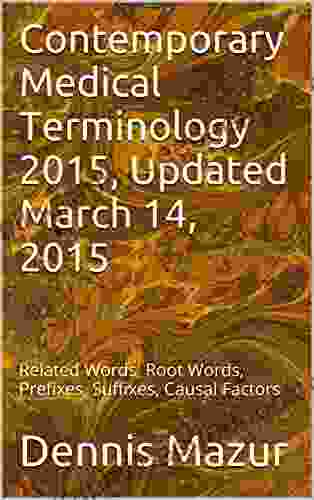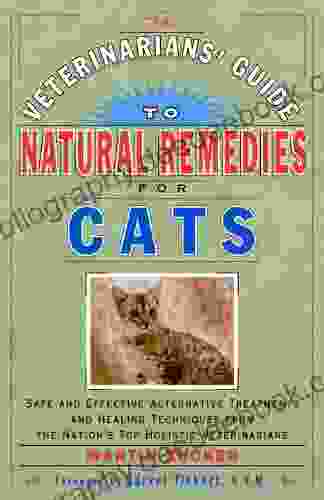Contemporary Medical Terminology: A Comprehensive Guide (Updated 2024)

The language of medicine is an ever-evolving field, with new terms and abbreviations emerging regularly. To effectively communicate in the healthcare field, it is essential to have a strong understanding of contemporary medical terminology.
5 out of 5
| Language | : | English |
| File size | : | 865 KB |
| Text-to-Speech | : | Enabled |
| Enhanced typesetting | : | Enabled |
| Print length | : | 176 pages |
| Lending | : | Enabled |
| Screen Reader | : | Supported |
| Paperback | : | 168 pages |
| Item Weight | : | 9.5 ounces |
| Dimensions | : | 6.14 x 0.37 x 9.21 inches |
Importance of Medical Terminology
Medical terminology plays a crucial role in the healthcare industry:
- Accurate Communication: Precise language ensures clear and accurate communication among healthcare professionals, reducing the risk of misinterpretations.
- Patient Safety: Correct terminology helps healthcare providers accurately document patient records, medications, and procedures, promoting patient safety.
- Diagnosis and Treatment: Understanding medical terms facilitates accurate diagnosis and appropriate treatment plans for patients.
- Collaboration: A shared language enables effective collaboration among different healthcare disciplines, such as doctors, nurses, pharmacists, and technicians.
- Research and Education: Medical terminology is essential for accessing and understanding medical literature, continuing education, and staying abreast of the latest advancements.
Types of Medical Terminology
Contemporary medical terminology can be categorized into several types:
- Anatomical Terms: Describe the structure of the human body and its components.
- Physiological Terms: Explain the functions and processes of the human body.
- Disease Terms: Identify and describe various diseases and conditions.
- Pharmacology Terms: Relate to medications, drugs, and their uses.
- Medical Procedure Terms: Describe diagnostic and therapeutic procedures.
- Abbreviations and Acronyms: Used for convenience and efficiency, these represent commonly used medical terms.
Anatomy Terms
Anatomical terms provide a structured way of describing the human body. Some key anatomical terms include:
- Superior: Upper or higher in relation to another structure.
- Inferior: Lower or below another structure.
- Anterior: Front of the body.
- Posterior: Back of the body.
- Medial: Towards the midline of the body.
- Lateral: Away from the midline of the body.
- Proximal: Closer to the point of attachment or origin.
- Distal: Further away from the point of attachment or origin.
Physiology Terms
Physiological terms describe the functions and processes of the human body. Examples include:
- Homeostasis: Maintenance of a stable internal environment despite external changes.
- Respiration: Exchange of gases between the body and the environment.
- Cardiovascular System: Heart and blood vessels, responsible for blood circulation.
- Digestive System: Breaks down and absorbs nutrients from food.
- Nervous System: Controls and coordinates body functions through nerve impulses.
- Endocrine System: Produces and regulates hormones.
Disease Terms
Disease terms identify and describe specific medical conditions. Common examples include:
- Diabetes: Chronic metabolic disorder characterized by high blood sugar levels.
- Cardiovascular Disease: Affects the heart and blood vessels, leading to conditions such as heart attack or stroke.
- Cancer: Uncontrolled growth and spread of abnormal cells.
- Pneumonia: Infection of the lungs.
- Sepsis: Life-threatening condition when the body responds to infection by damaging its own tissues.
- Alzheimer's Disease: Progressive neurological disorder that affects memory, cognitive function, and behavior.
Pharmacology Terms
Pharmacology terms relate to medications, drugs, and their uses. Some examples are:
- Generic Name: Chemical name of a drug.
- Brand Name: Trademarked name of a specific drug product.
- Dosage: Amount and frequency of medication administration.
- Side Effects: Unwanted effects of a medication.
- Interactions: Reactions that occur when medications are taken together.
- Contraindications: Conditions or situations where a medication should not be used.
Abbreviations and Acronyms
Abbreviations and acronyms are widely used in medical terminology for convenience and efficiency. Some common examples include:
- BP: Blood Pressure
- ECG: Electrocardiogram
- ICU: Intensive Care Unit
- MRI: Magnetic Resonance Imaging
- RN: Registered Nurse
- UTI: Urinary Tract Infection
Tips for Learning Medical Terminology
Learning medical terminology requires consistent effort and practice. Here are some tips:
- Start with the Basics: Familiarize yourself with prefixes, suffixes, and root words that form the building blocks of medical terms.
- Use Context: Practice applying terms in context through medical case studies or clinical scenarios.
- Use Flashcards: Create flashcards with terms on one side and definitions on the other for spaced repetition.
- Engage in Active Recall: Test yourself regularly by trying to recall terms and definitions without referring to notes.
- Review Regularly: Consistency and repetition are key to retaining medical terminology.
- Seek Professional Help: If needed, consider attending a medical terminology course or seeking guidance from a healthcare professional.
Contemporary medical terminology is an essential tool for effective communication in the healthcare field. By mastering the language of medicine, healthcare professionals can accurately document patient information, collaborate effectively, deliver appropriate care, and stay abreast of the latest advancements.
This comprehensive guide provides a strong foundation for understanding and utilizing medical terminology. With consistent practice and continuous learning, healthcare professionals can enhance their communication skills and contribute to improved patient outcomes.
5 out of 5
| Language | : | English |
| File size | : | 865 KB |
| Text-to-Speech | : | Enabled |
| Enhanced typesetting | : | Enabled |
| Print length | : | 176 pages |
| Lending | : | Enabled |
| Screen Reader | : | Supported |
| Paperback | : | 168 pages |
| Item Weight | : | 9.5 ounces |
| Dimensions | : | 6.14 x 0.37 x 9.21 inches |
Do you want to contribute by writing guest posts on this blog?
Please contact us and send us a resume of previous articles that you have written.
 Book
Book Novel
Novel Page
Page Chapter
Chapter Genre
Genre Reader
Reader E-book
E-book Magazine
Magazine Newspaper
Newspaper Paragraph
Paragraph Bookmark
Bookmark Shelf
Shelf Foreword
Foreword Annotation
Annotation Scroll
Scroll Codex
Codex Library card
Library card Biography
Biography Autobiography
Autobiography Reference
Reference Dictionary
Dictionary Narrator
Narrator Character
Character Librarian
Librarian Catalog
Catalog Borrowing
Borrowing Stacks
Stacks Archives
Archives Research
Research Lending
Lending Academic
Academic Journals
Journals Rare Books
Rare Books Study Group
Study Group Thesis
Thesis Dissertation
Dissertation Awards
Awards Reading List
Reading List Book Club
Book Club Theory
Theory Yvette Himmel
Yvette Himmel Barbara Goss
Barbara Goss Thomas Johnson
Thomas Johnson Richard D Smith
Richard D Smith Katy Colins
Katy Colins Paul Bilton
Paul Bilton Yvonnick Prene
Yvonnick Prene Angela Walters
Angela Walters D C Stricklin
D C Stricklin William Drozdiak
William Drozdiak T B Murphy
T B Murphy Neel Raman
Neel Raman Raymond W Ebbeler Mba
Raymond W Ebbeler Mba Angella Cooze
Angella Cooze Peter Vogl
Peter Vogl Derek Fox
Derek Fox Jerome Preisler
Jerome Preisler Lisa Phillips
Lisa Phillips Julian Bradbrook
Julian Bradbrook Tim Blevins
Tim Blevins
Light bulbAdvertise smarter! Our strategic ad space ensures maximum exposure. Reserve your spot today!
 Jackson BlairFollow ·8.6k
Jackson BlairFollow ·8.6k E.E. CummingsFollow ·2.2k
E.E. CummingsFollow ·2.2k Wade CoxFollow ·6.2k
Wade CoxFollow ·6.2k Avery SimmonsFollow ·11.8k
Avery SimmonsFollow ·11.8k Jared PowellFollow ·17.1k
Jared PowellFollow ·17.1k Melvin BlairFollow ·5.4k
Melvin BlairFollow ·5.4k Edgar Allan PoeFollow ·15.1k
Edgar Allan PoeFollow ·15.1k Ira CoxFollow ·13.8k
Ira CoxFollow ·13.8k

 Braden Ward
Braden WardFeminism's Forgotten Fight: The Ongoing Battle for...
The feminist movement has historically...

 Julio Cortázar
Julio CortázarBlue Heaven Black Night: A Literary Journey Through Love,...
In the realm of...

 Eddie Bell
Eddie BellA Journey Through Time: Exploring the Enchanting World of...
The vibrant tapestry of New...

 Lawrence Bell
Lawrence BellValiance Dragon Soul Press Anthology: A Literary Odyssey...
Step into a realm where...

 Aron Cox
Aron CoxEmbark on a Creative Odyssey with Jean Leinhauser's "101...
Unveil a Kaleidoscope of...
5 out of 5
| Language | : | English |
| File size | : | 865 KB |
| Text-to-Speech | : | Enabled |
| Enhanced typesetting | : | Enabled |
| Print length | : | 176 pages |
| Lending | : | Enabled |
| Screen Reader | : | Supported |
| Paperback | : | 168 pages |
| Item Weight | : | 9.5 ounces |
| Dimensions | : | 6.14 x 0.37 x 9.21 inches |














